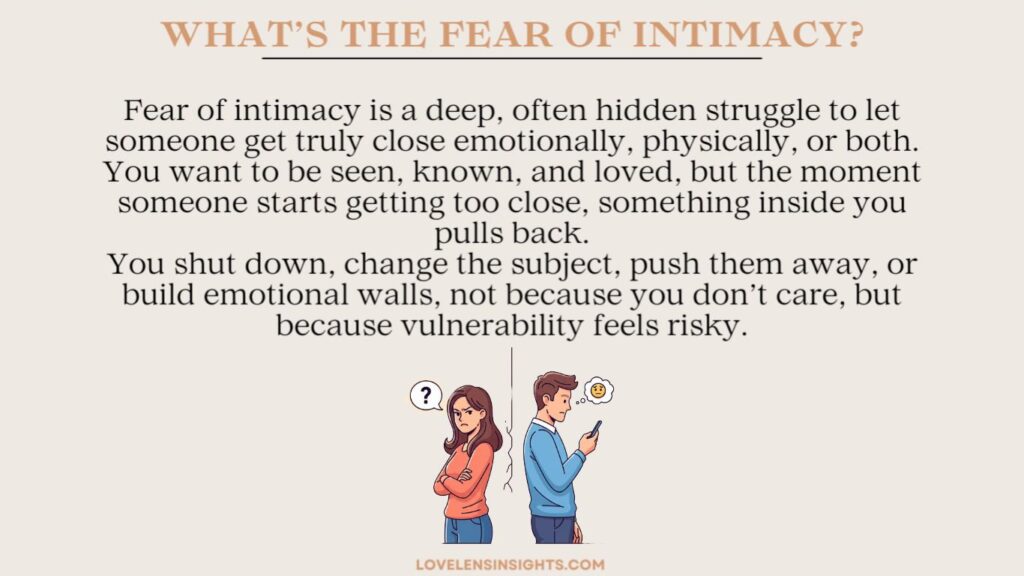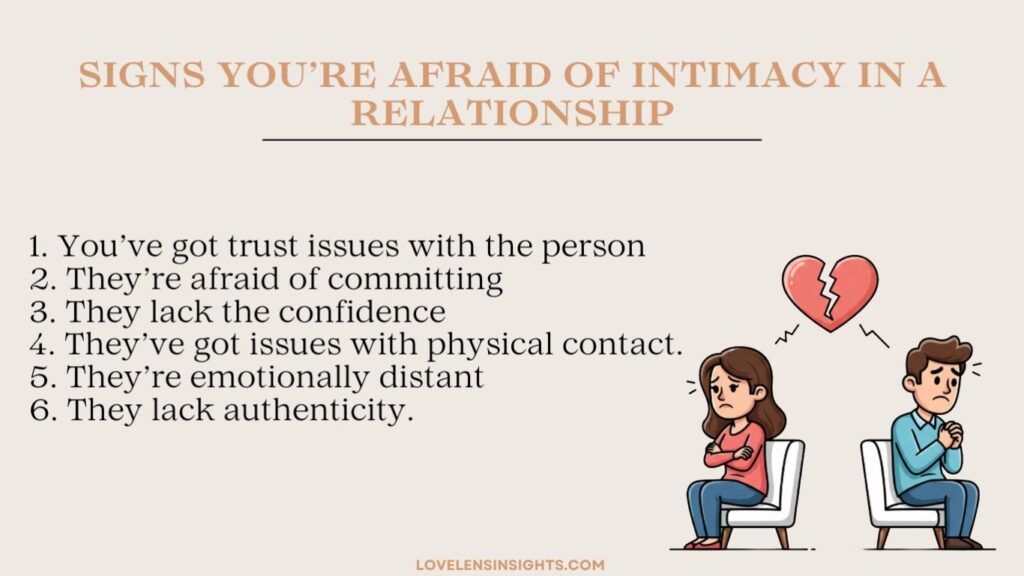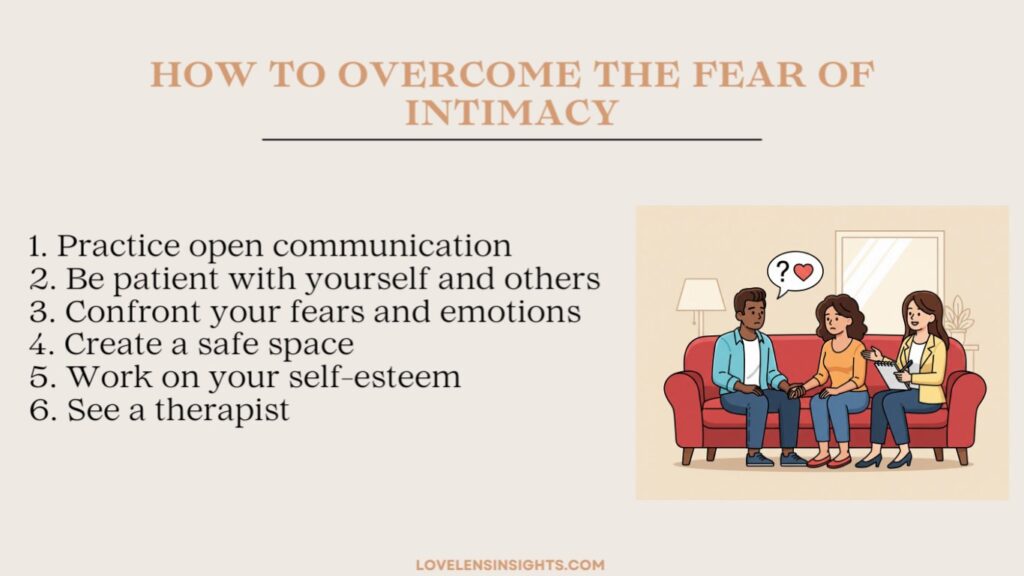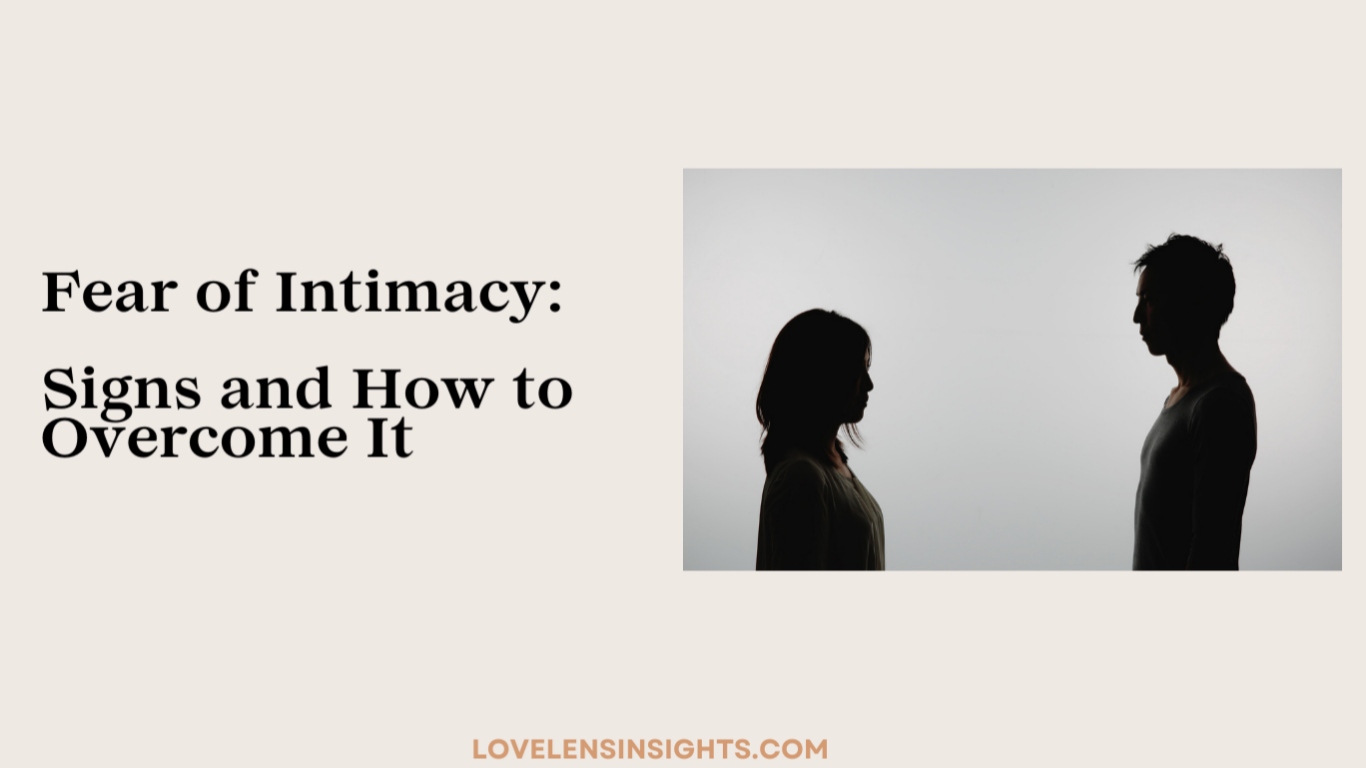
You’re texting someone you really like. It’s been going well, deep conversations, consistent check-ins, everything you once said you wanted. But then they ask where the relationship is going, and suddenly, your chest tightens.
You feel the urge to back off. You reply with a short text. You cancel plans. You start overthinking everything, and you don’t know why.
This is how fear of intimacy works. Despite craving connection, individuals with intimacy issues might push others away, creating a frustrating cycle of loneliness and unfulfilled relationships.
Somewhere along the line, you’ve learnt that love hurts and you shouldn’t get close, which is a very big lie.
This is how fear of intimacy works. As quiet and subtle as intimacy is, the fear creeps in when things start to feel real. It’s choosing people who won’t choose you, and that’s because you feel safer. It’s being in a relationship and still feeling alone, because you can’t fully commit.
So, in this article, we’ll explore what fear of intimacy really looks like, signs you are afraid of it, and how to begin healing by choosing to walk through the fear, and that’s leaning toward real connection.
Ready? Let’s get started.
Fear of intimacy is a deep, often hidden struggle to let someone get truly close emotionally, physically, or both. It’s not about disliking connection, it’s about craving closeness while also feeling unsafe in it.
You want to be seen, known, and loved, but the moment someone starts getting too close, something inside you pulls back.
You shut down, change the subject, push them away, or build emotional walls, not because you don’t care, but because vulnerability feels risky.
Fear of intimacy is more than just avoiding closeness. It’s a quiet defence mechanism, often built from pain. Every time someone tries to get too close, your mind tells you to run for your dear life.
The fear of intimacy is a scar, and behind it is a heart that’s just trying to protect itself the only way it knows how.
At its core, intimacy vs. isolation is the internal push-and-pull between the desire to be deeply connected to someone and the fear (or experience) of being alone, withdrawn, or emotionally distant.
As we grow, we all start to want more than a surface-level connection. We want relationships that are honest, deep, and safe, but reaching that level of closeness requires us to open up, be vulnerable, and allow someone else to truly see us.
And guess what? That’s where the tension begins.It is because closeness also comes with risk.
Erik Erikson, a developmental psychologist, proposed that human life unfolds in eight psychosocial stages, each with a key conflict that shapes our emotional and psychological growth. One of the most critical stages, especially in young adulthood, is the sixth stage, called Intimacy vs. Isolation.
If a person successfully resolves this stage, they develop the ability to form deep, secure, loving relationships. This is what Erikson calls intimacy in relationships.
It’s emotional honesty, commitment, and shared identity with another person, without fear of being swallowed or abandoned.
If the stage is not successfully navigated, the person may retreat into isolation. This means emotional withdrawal, fear of vulnerability, avoidance of closeness, or a pattern of surface-level connections that never go deep.
So, intimacy vs. isolation isn’t just a phase; it’s a turning point. It determines whether we build our lives on connection or self-protection. Whether we build with others or remain emotionally behind walls.
Fear of intimacy, also known as intimacy avoidance or fear of commitment, can manifest in different ways for different individuals.

Source: Tenor
A major sign you cringe at intimacy is that you don’t trust anyone due to past experiences of betrayal, disappointment, or emotional harm.
It’s the internal struggle to believe that someone’s intentions are genuine, that their love is consistent, or that they won’t cause pain if given access to your vulnerable parts.
This mistrust often doesn’t come from your current partner; truth be told, it might be from the past.
Maybe there was betrayal in your former relationship, emotional neglect from a parent, or broken promises that never got repaired.
This has caused you to rely on yourself, and while this self-protection helps you feel in control, it also keeps you isolated.
Gary Vaynerchuk, Chairman of VaynerX, agrees that some will hurt you, but when you say no to everyone, you miss out on those who will love you. Instead of resting in love, you stay on high alert, looking for signs that your partner is about to drop.
You guard your thoughts and hide parts of yourself. And while it may look like you are simply being careful, what’s really happening is that fear has convinced you that being fully known is too dangerous.
Sexual immaturity, in the context of fear of intimacy, isn’t about age or inexperience. It’s about how you handle the emotional, relational, and physical aspects of sex within a relationship.
Someone who is sexually immature, like you, might see sex only as a physical act or as something to avoid entirely, without understanding or embracing the deeper emotional connection that healthy intimacy involves.
You might treat sexual closeness casually to avoid vulnerability or feel overwhelmed by the idea of it. You may also practice non-sexual intimacy because you don’t fully trust your partner yet.
This disconnect shows up when you can’t comfortably engage in conversations about physical needs, boundaries, or desires.
Rather than creating space for mutual exploration and emotional safety, you may use sex as a performance, a bargaining tool, or a space of fear.
It then becomes a sign of intimacy disorder because it reflects an inability to merge emotional closeness with physical vulnerability.
It’s not that you don’t want connection, it’s that the weight of being fully seen, even in the most vulnerable moments, feels too much to bear.

Source: Tenor
One of the clearest outward signs that you are struggling with a fear of intimacy is physical contact issues. This doesn’t just mean rejecting hugs or sexual closeness; it extends to stiffening when touched, avoiding eye contact during affectionate moments, or feeling uncomfortable with seemingly simple gestures like hand-holding, cuddling, or sitting too close.
That physical contact feels threatening because touch to you often carries emotional weight. A hug might feel like exposure. A gentle caress might feel like an invitation to be seen too deeply.
So instead of leaning into those moments, you retreat. You might laugh it off, shift away, or change the subject when physical closeness begins to build. This discomfort with touch isn’t about the act itself but what it symbolises — safety, trust, closeness, and surrender.
If you have learned (consciously or not) that closeness leads to pain or abandonment, then even a loving touch can trigger defensiveness. Your body goes into self-protection mode because touch makes them feel vulnerable and blocks the very thing you long for.
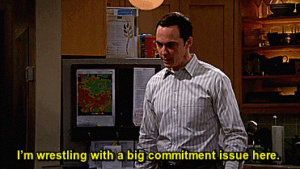
Source: Giphy
Fear of commitment is another sign of intimacy struggles because commitment requires more than just showing up, and for someone like you who fears intimacy, that level of emotional exposure can feel overwhelming.
This fear often hides behind a deeper anxiety, and you begin to ponder on the aftermath of giving yourself fully, and it ends in pain? Or what if you lose your freedom, lose yourself, or get stuck in something you can’t control?
Your fear of commitment will make you start looking for flaws in your partner; you might begin to self-sabotage or constantly doubt if you are with the right person. You will come to find means of leaving because staying feels like surrendering control.
Commitment requires risk, and to you, battling fear of intimacy, that risk feels unbearable. You prefer to stay on the edge of romantic relationships, never fully in, never fully out, hoping to feel safe without ever truly committing.
You forget that love can’t grow in that space, and real love needs something to hold on to.
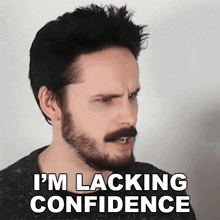
Source: Tenor
Lack of confidence may not seem like an obvious sign of fear of intimacy at first, but it’s actually one of the most hidden and impactful.
When you don’t feel secure in yourself or when you constantly doubt your worth, your attractiveness, your voice, or what you bring to the relationship, you often struggle to fully open up. Why? Because intimacy requires exposure, and if deep down you believe you’re not enough, that exposure feels terrifying.
This lack of confidence becomes a barrier to closeness. You may fear expressing desires, setting boundaries, or being emotionally honest, and that’s because you assume it’ll lead to rejection, abandonment, or judgment.
And when those thoughts take over, a real connection feels too risky, too exposing, and too painful to pursue.
Authenticity is not perfection. Being authentic means showing up as your true self, and that’s without masks, without performances, without filtering your thoughts, feelings, or personality to gain approval or avoid rejection.
It’s the ability to be honest about who you are, what you want, how you feel, and what matters to you, even when it feels risky. It’s simply self-honesty.
In the context of intimacy, lack of authenticity becomes a clear sign that someone is afraid of closeness. Why? Because intimacy requires you to be seen, and if you don’t feel safe being seen for who you really are, you’ll shape-shift.
You’ll suppress your needs, exaggerate your confidence, hide your insecurities, or become the version of yourself you think your partner wants. But this lack of authenticity creates a lonely kind of relationship, where connection exists only on the surface.
Emotional distance doesn’t always look like coldness. It can be polite, consistent, even affectionate, but it lacks depth. It’s like being close enough to touch but never deep enough to feel. And this creates a growing gap in meaningful relationships, where one person is present physically but absent emotionally.
It’s not about physical absence or a lack of conversation; it’s the quiet wall that forms when someone refuses to let another person into their inner world.
You may laugh, talk, and even confess your feelings, but there’s always something missing, which is a depth they won’t go to, a part of yourself you keep locked away.
As a result of your hurt, you’ve been taught that vulnerability leads to pain, then opening up becomes something to avoid at all costs, and getting your partner in means revealing not just the good parts but the fragile ones too, which you won’t dare.
Intimacy issues can feel overwhelming, and you may feel worried that you’re letting yourself and others down. Whatever you’re facing, there are ways to find relief and start feeling more at ease in your intimate relationships.
The best way to work through a fear of intimacy is:
Communication, as the name implies, is a force that drives communion between you and your partner. One of its greatest values is that it lays the foundation for trust, clarity, and emotional intimacy.
In the context of overcoming fear of intimacy, true connection comes from openness. When you allow yourself to express what you feel, what scares you, what you hope for, and even what you don’t yet understand about yourself, you begin to dismantle the walls that fear has built.
GarryVee says, “Trust everyone until they show you you can’t trust them. Practice opening your heart and being vulnerable. You’ll soon realize people breaking your trust are not hurting you; they are hurting themselves.”
It may feel uncomfortable at first. You might worry that saying too much will push them away. But the truth is, intimacy grows where authenticity is spoken and received with compassion.
The more you communicate openly, the more you teach yourself that being seen doesn’t have to lead to rejection. It can lead to deeper connections.

Source: Giphy
Overcoming fear of intimacy is a process of unlearning, healing, and growing. It requires time, compassion, and patience, especially with yourself.
You’re not broken because closeness feels hard. You’re human. And often, the hesitation to let someone in is rooted in very real experiences.
So give yourself room to grow without rushing the journey. Don’t beat yourself up when you notice yourself pulling back or feeling overwhelmed by vulnerability. Instead, pause, acknowledge it, and take one small step forward.
Healing rarely happens in leaps. It happens in moments where there is one honest conversation, or one choice to stay open when you’re tempted to retreat. And just as you’re learning to be patient with yourself, extend that same grace to others.
If you’re in personal relationships, remember that your partner might not always understand your fear, but that doesn’t mean they don’t care. Let them learn with you, not against you. Let patience be the ground where both love and healing can grow.
Another most important step in overcoming fear of intimacy is to stop running from the very thing you’re afraid of. Avoidance may feel safe in the moment, but it only reinforces the idea that intimacy is something dangerous or unmanageable.
Instead, as psychologist Susan David has wisely said, “We all experience fear. There are so many moments in our world that scare us, whether fear of the unknown or fear of vulnerability, fear of the future or the past.
Sure, going for that promotion or career change can be scary. But sometimes fulfillment, growth, and new relationships are waiting for us on the other side of discomfort. Don’t stay stuck in the familiar just because it’s comfortable.”.
Let your values guide you. If connection, love, and truth matter to you, then let those values be stronger than your fear. Walk toward intimacy because it’s meaningful.
You can feel fear and still choose to be vulnerable. You can be uncertain and still take a step forward. Your emotions are not your enemy. Listen to them, learn from them, and then lead them.

Source: Giphy
Low self-esteem often contributes to fear of intimacy. It hides behind the quiet belief that you’re not enough or that if someone truly saw all of you, they wouldn’t stay. That’s why building healthy self-esteem is such a vital part of overcoming intimacy fears.
When you begin to feel comfortable in your own skin and recognize your value without needing constant validation, you become more secure in close relationships and less threatened by closeness.
With healthy self-worth, you’re more likely to set clear boundaries. You won’t overextend to earn love, and you won’t collapse when faced with disappointment. You’ll know that rejection, while painful, doesn’t define your value.
Intimacy flourishes where safety exists, and that’s not just physical safety, but emotional safety. That’s why it’s essential to intentionally create a space internally and relationally where openness doesn’t feel like a risk, but a refuge.
Cristina Davy, a relationship coach, puts it well and says, “When you trust your ability to recognize red flags, set boundaries, and walk away if needed, you’ll feel more confident giving people a chance without feeling like you are risking everything.”
Creating that space starts with learning to trust yourself. When you know that you can speak up, protect your peace, and make healthy choices, intimacy no longer feels like something that will consume or trap you. It becomes something you can enter into with clarity and confidence, not fear.
Therapy provides a safe, non-judgmental space to explore where the fear began, how it’s affecting your adult relationships, and what steps you can take to move forward.
A skilled therapist helps you untangle the emotional knots of those quiet beliefs that say you’re not safe, not lovable, or not enough and gradually replace them with truth, safety, and self-awareness.
Asking for help is not a weakness; rather, it’s wisdom, and it might just be the bravest step you take toward the love and closeness you’ve always wanted.
Healing starts with awareness. From there, it grows with honesty, patience, and the courage to keep showing up, even when it feels uncomfortable. Step by step, you can unlearn the lies fear has taught you and build connections that feel safe, real, and fulfilling.
Remember, you don’t have to be fearless to love, you just have to be willing. Every time you lean in instead of pulling away, every time you choose truth over hiding, you are already rewriting your story. And on the other side of that fear is the intimacy you’ve always longed for, which is deep, safe, and worth the risk.
Yes. Many people with a fear of intimacy are in relationships. They just struggle to let themselves be fully known or emotionally vulnerable. The relationship may look fine on the outside, but inside, it can feel emotionally distant or uncertain.
Not always, but often it’s rooted in past experiences that taught your nervous system that closeness is risky. Often, it’s a slow buildup of emotional disappointments that shapes your response to connection.
Absolutely. Fear of intimacy is not a permanent condition. It’s a response, and responses can be changed.
